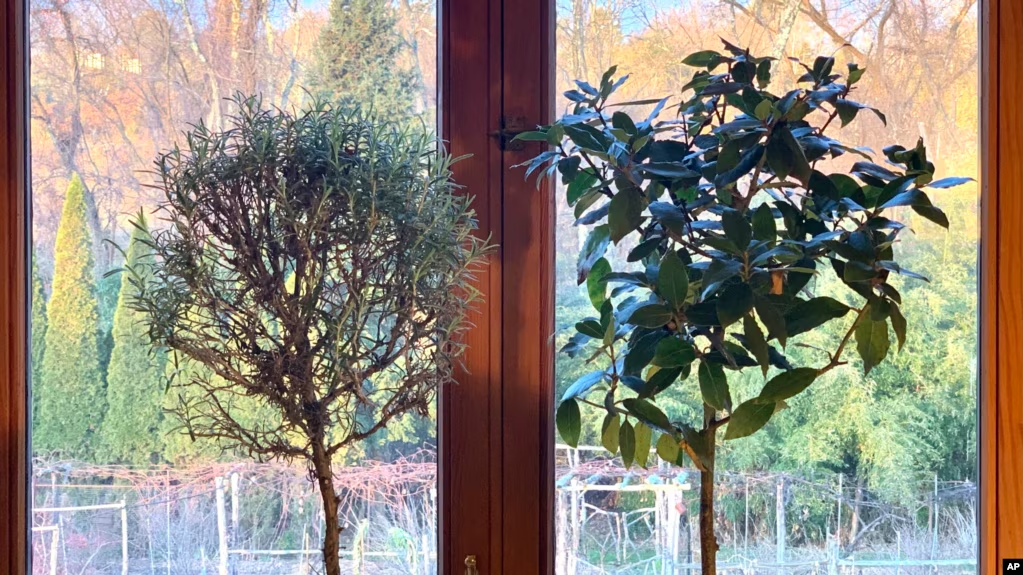Two Edible Plants Grow Well Indoors During Winter
Two Edible Plants Grow Well Indoors During Winter
今回は、冬の寒い時期でも室内で楽しめるハーブやローズマリーなどを紹介した記事です。窓辺で緑の葉を眺めたり、料理に香りを添えたりすると、少し気分が明るくなりますよね。どちらの植物も元気に育てるためには、土の質がとても大切とのこと。文中の「soil」は「土壌」や「植物を育てるための土」という意味で、rich soil(肥えた土)、well-drained soil(水はけのよい土)などのように使われます。あなたなら、どんな植物を家の中で育ててみたいですか?

1.Article
Directions: Read the following article aloud.
Do you want to grow plants inside during the cold weather? If so, you may want to consider some plants that can flavor your food and make your home smell nice at the same time.
We are talking about the herbs rosemary and bay laurel.
Both plants do well inside, near a sunny window in the cold weather as long as the temperature is warm and you keep them watered.
Both rosemary and bay laurel come from the part of the world near the Mediterranean Sea. The area is cool but not icy during winter and it gets lots of sunlight.
Gardening expert Lee Reich of the Associated Press says it is important to keep these plants “happy and alive” in the cooler months.
So, how do you do it?
For rosemary, water level is very important. The plant needs soil that is a little bit wet all the time but never soaked. Too much water will kill the plant. You can plant rosemary in a container with soil that is about 25 percent sand, perlite or vermiculite. Perlite and vermiculite help soil hold water.
Rosemary can add a nice taste to food but it also can make a room smell good. So if you have it growing inside, it is a good idea to place the container near an airflow source, like a door that is used often. That way the pleasant smell of rosemary floats through the air.
Bay laurel has dark, green leaves and produces a nice smell when picked. When added to food, Reich notes, it makes soups and tomato sauces taste better. You need to crush the leaves after you pick them to release the flavor.
If you want to grow the plants inside to make your home look good, you can cut unwanted branches from the plant as it grows and make it look like a small tree. You will not hurt the plant if you do this. Most plants that grow this way get a little bit taller than 65 centimeters.
Rosemary and bay laurel can live for more than 10 years if they are cared for.
Every two years it is a good idea to replace the soil and add the plant to a larger container.
You can move them outside when the weather gets warm. The plants will like the change. And you can welcome the rosemary and bay laurel back into your home for many winters to come.
We are talking about the herbs rosemary and bay laurel.
Both plants do well inside, near a sunny window in the cold weather as long as the temperature is warm and you keep them watered.
Both rosemary and bay laurel come from the part of the world near the Mediterranean Sea. The area is cool but not icy during winter and it gets lots of sunlight.
Gardening expert Lee Reich of the Associated Press says it is important to keep these plants “happy and alive” in the cooler months.
So, how do you do it?
For rosemary, water level is very important. The plant needs soil that is a little bit wet all the time but never soaked. Too much water will kill the plant. You can plant rosemary in a container with soil that is about 25 percent sand, perlite or vermiculite. Perlite and vermiculite help soil hold water.
Rosemary can add a nice taste to food but it also can make a room smell good. So if you have it growing inside, it is a good idea to place the container near an airflow source, like a door that is used often. That way the pleasant smell of rosemary floats through the air.
Bay laurel has dark, green leaves and produces a nice smell when picked. When added to food, Reich notes, it makes soups and tomato sauces taste better. You need to crush the leaves after you pick them to release the flavor.
If you want to grow the plants inside to make your home look good, you can cut unwanted branches from the plant as it grows and make it look like a small tree. You will not hurt the plant if you do this. Most plants that grow this way get a little bit taller than 65 centimeters.
Rosemary and bay laurel can live for more than 10 years if they are cared for.
Every two years it is a good idea to replace the soil and add the plant to a larger container.
You can move them outside when the weather gets warm. The plants will like the change. And you can welcome the rosemary and bay laurel back into your home for many winters to come.
Dan Friedell adapted this story for Learning English based on a story by Lee Reich of the Associated Press.
Source:Two Edible Plants Grow Well Indoors During Winter
VOA
本教材は、the U.S. Agency for Global Mediaより許諾を得て、産経ヒューマンラーニング株式会社が編集しています。
テキストの無断転載・無断使用を固く禁じます 。
